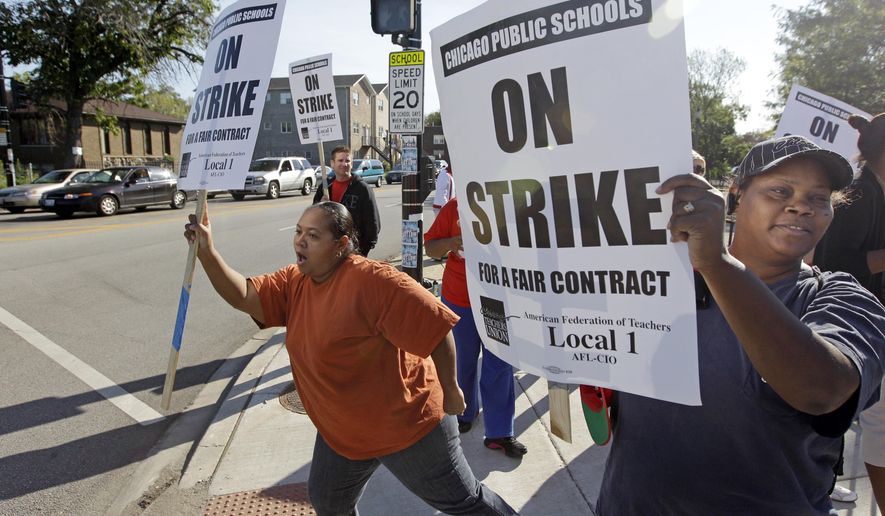CHICAGO (AP) - Contract negotiations between Chicago teachers and officials in the nation’s third-largest school district will happen throughout the weekend in hopes of reaching a deal to avert a strike.
The Chicago Teachers Union has said its members are prepared to stop instruction for about 400,000 students as early as Tuesday morning for its second major strike since 2012, when teachers were out for seven school days. At issue during the negotiations, which have stretched into a second year, are pension contributions, pay raises, staffing levels and classroom funding.
Union leaders say teachers “do not want to strike, but are concerned about threats to reduce their pay and benefits, as well as the overall impact of school-based cuts on their students,” while Chicago Public Schools CEO Forrest Claypool has said teachers deserve a raise but that the district is facing massive financial challenges.
Here’s a look at the situation:
___
THE ISSUES
The cash-strapped school district wants to phase out the decades-old practice of paying most of teachers’ pension contributions, replacing it with a total base wage increase in a four-year contract. The union wants the district to keep up the pension payments and seeks raises at the end of a three-year contract.
The district, which has offered other “quality of life” changes such as less paperwork, also wants teachers to pay more for rising health care costs.
Union President Karen Lewis said it amounts to an overall pay cut at a time when teachers are struggling to make ends meet and to do their jobs, given that schools have lost some special education resources and librarians due to budget cuts. Plus, the district ended automatic pay raises for experience and education last year.
The bargaining unit of the union - representing about 28,000 members - rejected the district’s last offer in February.
___
THE BACKDROP
The threat of a strike is set against perilous financial problems for Chicago’s public schools as well as the state of Illinois.
The district announced layoffs Monday for about 250 teachers and staff due to a larger-than-anticipated drop in enrollment.
Credit rating agencies have placed the district at “junk” status, or below investment grade, while its $5.4 billion budget relies on increased property taxes, borrowing and $215 million in state funding.
But the state funding is contingent on a wider pension overhaul that must be approved by state lawmakers, who are deadlocked over the budget with Republican Gov. Bruce Rauner. The Republican also has pushed to curb union power, suggested the district file for bankruptcy and unsuccessfully attempted a state takeover of the district’s finances.
___
WHERE DO THE KIDS GO DURING A STRIKE?
All schools will be open during normal hours and staffed by non-union employees to provide online learning, physical education and arts and crafts.
Classes and extra-curricular activities will be canceled, but free breakfast and lunch will be provided to students who need them. Safe Passage routes, which are staffed by adults to help kids get to and from school safely, will operate as usual.
The district also has partnered with libraries, the park district and “Safe Haven” locations, such as churches, that will provide child care.
___
OTHER FACTORS
The 2012 strike was the first teacher walkout in 25 years and tied to evaluations, classroom conditions and job security.
Parents and community leaders were largely supportive then, but it’s unclear whether the sentiment will stick this year. Plus, the threat of a strike comes as Chicago residents have seen major increases in property taxes and other fees, and an uptick in street violence.
“It will be a difficult strike,” University of Illinois at Chicago professor and former alderman Dick Simpson said. “I’m not sure that anyone wants to play it all the way out.”
One thing is clear: There’s a different tone in negotiations. In 2012, the outspoken Lewis and Mayor Rahm Emanuel were often at odds. Emanuel had canceled a pay raise, and Lewis dubbed him “the murder mayor” because of city violence, briefly considering challenging him in the 2015 mayor’s race.
More recently, Lewis has been almost complimentary, saying Emanuel’s job is “impossible” and their relationship now “respectful.”




Please read our comment policy before commenting.